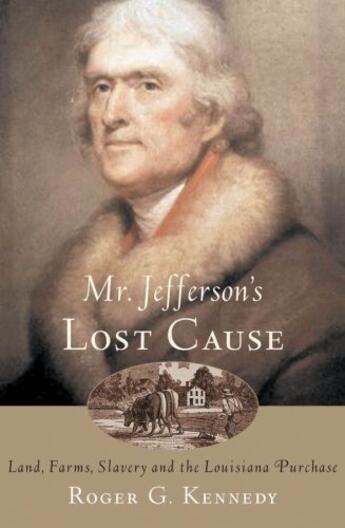Des idées de lecture pour ce début d'année !
Passionné(e) de lecture ? Inscrivez-vous
gratuitement ou connectez-vous pour rejoindre la
communauté et bénéficier de toutes les fonctionnalités du site !

Thomas Jefferson advocated a republic of small farmers--free and independent yeomen. And yet as president he presided over a massive expansion of the slaveholding plantation system--particularly with the Louisiana Purchase--squeezing the yeomanry to the fringes and to less desirable farmland. Now Roger Kennedy conducts an eye-opening examination of that gap between Jefferson's stated aspirations and what actually happened.
Kennedy reveals how the Louisiana Purchase had a major impact on land use and the growth of slavery. He examines the great financial interests (such as the powerful land companies that speculated in new territories and the British textile interests) that beat down slavery's many opponents in the South itself (Native Americans, African Americans, Appalachian farmers, and conscientious opponents of slavery). He describes how slaveholders' cash crops (first tobacco, then cotton) sickened the soil and how the planters moved from one desolated tract to the next. Soon the dominant culture of the entire region--from Maryland to Florida, from Carolina to Texas--was that of owners and slaves producing staple crops for international markets. The earth itself was impoverished, in many places beyond redemption.
None of this, Kennedy argues, was inevitable. He focuses on the character, ideas, and ambitions of Thomas Jefferson to show how he and other Southerners struggled with the moral dilemmas presented by the presence of Indian farmers on land they coveted, by the enslavement of their workforce, by the betrayal of their stated hopes, and by the manifest damage being done to the earth itself. Jefferson emerges as a tragic figure in a tragic period.
Il n'y a pas encore de discussion sur ce livre
Soyez le premier à en lancer une !

Des idées de lecture pour ce début d'année !

Si certaines sont impressionnantes et effrayantes, d'autres sont drôles et rassurantes !

A gagner : la BD jeunesse adaptée du classique de Mary Shelley !

Caraïbes, 1492. "Ce sont ceux qui ont posé le pied sur ces terres qui ont amené la barbarie, la torture, la cruauté, la destruction des lieux, la mort..."